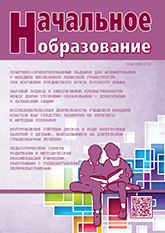The article discusses a problem that arose in connection with the peculiarities of human existence in isolation caused by the coronavirus epidemic. From the standpoint of philosophy, sociology, psychology, the author examines approaches to providing specific pedagogical, psychological and emotional assistance to children, their parents, all those who find themselves and may find themselves in the future cut off from their usual life and activities - study, work, communication, rest. Recommendations are given on the organization of distance learning in the modern system of school education.
new reality; the need for adaptation; digital educational space; disadvantages of organizing distance learning; benefits and risks; requirements for digital educational systems; information and communication platforms
1. Kuznecov A.A., Grigor'ev S.G., Grinshkun V.V. Obrazovatel'nye elektronnye izdaniya i resursy [Educational electronic publications and resources]. Moscow: Drofa Publ., 2009. 156 p. EDN: https://elibrary.ru/QWSZMV
2. Minin A.Ya. Informacionnye tekhnologii v obrazovanii [Information technologies in education]. Moscow: MPGU Publ., 2016. 145 p. EDN: https://elibrary.ru/OCKXKW
3. Okolelov O.P. Cifra v obrazovanii. Didakticheskie sredstva razrabotki cifrovyh i gibridnyh obrazovatel'nyh system [The number in education. Didactic tools for the development of digital and hybrid educational systems]. Moscow: Filin" Publ., 2018. 154 p.
4. Robert I.V. Teoriya i metodika informatizacii obrazovaniya. Psihologo-pedagogicheskij i tekhnologicheskij aspekty [Theory and methodology of informatization of education. Psychological, pedagogical and technological aspects]. Moscow: Binom Publ., 2008. 404 p.
5. Sharipov F.V., Ushakov V.D. Pedagogicheskie tekhnologii distancionnogo obucheniya [Pedagogical technologies of distance learning]. Moscow: Universitetskaya kniga Publ., 2016. 301 p. EDN: https://elibrary.ru/ZUYFTL






